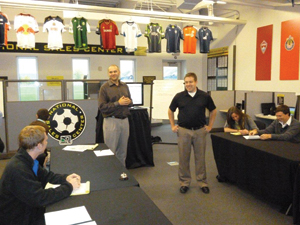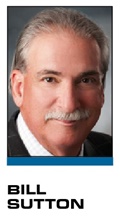What does Abbott and Costello’s classic comic bit “Who’s on first?” have to do with teaching sales? How about Will Ferrell’s bonding with his sibling in the film “Step Brothers”? And how does that relate to studying the 1960 Kennedy/Nixon televised debates? Ask any trainee at the MLS National Sales Center in Blaine, Minn., and they will tell you it’s all in a day’s work or, in their case, class.
The MLS National Sales Center model — small classes, dorm living, reading, education and a good dose of pop culture — is almost like attending a small liberal arts college where the goal is broadening one’s world view, learning how to think, and then learning how to express those thoughts and communicate them to a variety of audiences. Only after that has occurred does a trainee learn to apply those techniques to ticket sales and begin calling prospective buyers for the various MLS clubs.
“When you think about it, sales requires great communication and problem-solving skills. Our fundamental approach is to transfer this knowledge through a repeatable, ‘express, model and reinforce’ system and build confidence along the way,” said Sean Ream, director of sales for the National Sales Center.
 |
Managers Jeff Berryhill (left) and Sean Ream share some laughs with trainees during an exercise.
Photo by: MLS NATIONAL SALES CENTER
|
Rather than just teaching sales techniques, the center begins by teaching the importance and philosophy of communication and applying it to sales. There is a solid foundation in communication and fertile ground for the concepts of sales to grow once they have been introduced. The trainer/managers use teaching aids that engage the candidates and help them learn, envision and embrace the importance of being a great communicator while also beginning to better understand themselves and what each of them has to offer.
During my visit, there were two sessions, or classes in residence. One group had been there for six to eight weeks while the other session had recently arrived and were at the early stages of training. The more advanced session had been making calls for several weeks and generating sales for two MLS clubs. The sales manager has the technology to listen in on any call and tape those calls for later playback and analysis with the candidates. The managers also can integrate themselves into the call through instant messaging and offer online tips and suggestions to the candidate during the sales call.
Where possible, the center attempts to inject historical and pop culture video content and references into the lessons and throughout the curriculum. This approach not only keeps the learning environment fun and fresh but provides a familiar context necessary for retaining core teachings for the young trainees. A great example observed on my visit was around the topic of building rapport. A hilarious scene from the movie “Step Brothers” was highlighted. In this case, the scene characterized by Ferrell and John C. Reilly as they identify shared interests nicely reinforced the importance of building connections at the start of a relationship.
 |
A hilarious scene from “Step Brothers” nicely reinforced the importance of building connections at the beginning of a relationship.
|
I also observed “Ben” and his sales manager Jeff Berryhill replaying and grading a call that Ben had made the previous week. They analyzed the call and the approach to determine what Ben did well and what he could improve upon. This provided a great opportunity to understand the path of questions and how to build upon those questions and their responses. The goal is to ask better questions and in the proper sequence, and thereby achieve better outcomes.
That afternoon we left the center and took a class trip to the Brave New Workshop in downtown Minneapolis where John Sweeney and his cast taught the trainees about improvisation and how it can help improve their sales techniques. Improvisation is used to break down inhibitions, essential in developing confidence in listening and speaking to strangers. “It’s about practicing how to be comfortable in an uncomfortable situation,” said Sweeney, who has consulted with a number of NBA clubs and a variety of businesses. Trainees learned improv techniques through games such as “What’s in the box?” which prepares them to hear objections and try to turn negatives into positives, and “Newsstand,” which focuses on listening and up-selling.
While the MLS National Sales Center generates revenue for the league and its clubs, that isn’t the primary intent nor the only desired outcome of the process. The emphasis here is thorough training and development while learning how to communicate and sell. The primary focus is on preparing the candidate for long-term success rather than generating revenue with a great ROI because of the low cost of sale. While that opportunity exists, developing and supplying talent to the teams is the desired outcome.
A well-trained ticket sales staff that enjoys what it does should result in a longer-tenured sales staff, and longevity and experience is the key to increased productivity. As these candidates begin to populate the various MLS teams, there will be a systemic sales process throughout the league that in my opinion would be one of the best that I have seen.
“The NSC is not only a national talent development initiative but it is a laboratory for all aspects of the sales process including exploring new sales management techniques and fresh ways to enhance a sales culture,” said Bryant Pfeiffer, vice president of club services for MLS and who sold the league’s leadership on this sales laboratory. “It is a great example of the innovative approach MLS is taking as a league to continue to grow the sport of soccer in this country.”
I entered the center to the sounds of the Oklahoma State fight song, which was played in my honor. I left with the memories of seeing a comfortable and confident group of future sellers poised to become revenue difference-makers for whatever club was lucky enough to employ them. n
Bill Sutton (wsutton1@usf.edu) is the founding director of the sport and entertainment business management MBA at the University of South Florida, and principal of Bill Sutton & Associates. Follow him on Twitter @Sutton_Impact.






